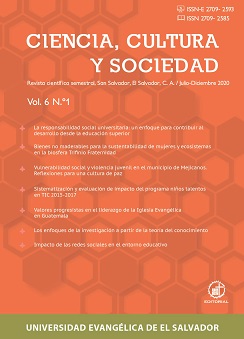University social responsibility. an approach to contribute to development from higher education
DOI:
https://doi.org/10.5377/ccs.v6i1.10530Keywords:
University Social Responsibility, Model, nalysis, ThematicAbstract
Ricardo Gaete Quezada, from the University of Chile, has carried out a survey of approaches on University Social Responsibility (RSU) that are prevalent today, which has allowed him to establish an analysis model on the subject. Gaete has established that on the basis of the contents and the way in which the RSU is assumed can be located in three different perspectives or approaches: First, the normative from which the RSU is understood as the «Development of value frameworks from the university as a normative axis to make what is correct in life in society, through the establishment of national or global university networks around social responsibility. ”1 Second, the manager or director in whom USR is understood as a posture of concern for analyzing the impact of work university students in society, above all, through the rendering of accounts of their actions and decisions towards their stakeholders. Third, the transformational approach of USR that leads the contributions and reflections to achieve a better, more equitable and just society with special attention to sustainable development, where the university is the institution capable of showing which are the best ways to build a better society.
Downloads
838
Downloads
Published
How to Cite
Issue
Section
License

This work is licensed under a Creative Commons Attribution-NonCommercial 4.0 International License.
The authors give to the copyright to the journal Ciencia, Cultura and Sociedad, and copyright in all forms and media, to be notified of acceptance of your article. The authors can publish their articles in another journal after a semester published in this volume. The content of the articles is the sole responsibility of the authors. To refer to the articles correctly quote the authors.

Ciencia, Cultura y Sociedad articles are published in open access and are under a Creative Commons Attribution-NonCommercial 4.0 International License.

